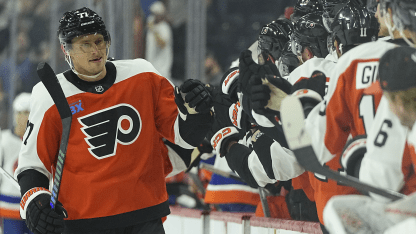Erik Johnson appreciates the long road it's taken for him to reach 1,000 games in the NHL.
The Philadelphia Flyers defenseman also knows it's a journey that could’ve reached its destination years earlier.
"I've certainly played long enough to have hit it a while ago," Johnson said. "But I've had some real tough injuries, some I wasn't sure I was going to come back from, from knees to concussions to whatever. I've had some tough ones that I really had to grind and rehab and come back from. Certainly affected the timeline of it, for sure.
“But I've just tried to wake up every day and just attack whatever's been thrown at me and just grind away and attack my rehab, attack my training, and just try and play as long as I can, as hard as I can. I just love coming to the rink, showing up and playing and working."
That he's still showing up and playing after what he's gone through during his 17 NHL seasons speaks to a mental toughness that rivals the physical toughness it takes to play as long as he has.
Johnson will become the 403rd NHL player to reach 1,000 games when he plays his next game, possibly Saturday, when the Flyers play the Buffalo Sabres at Wells Fargo Center (7 p.m. ET; NBCSP, MSG-B).
The 36-year-old has two points (one goal, one assist) and is averaging 12:58 of ice time in 12 games this season. Selected by the St. Louis Blues with the No. 1 pick of the 2006 NHL Draft, the 36-year-old has 345 points (94 goals, 251 assists) in 999 regular-season games with the Blues, Colorado Avalanche, Sabres and Flyers, and 13 points (five goals, eight assists) in 55 Stanley Cup Playoff games. He helped the Avalanche win the Cup in 2022.
He's the 23rd player selected No. 1 at the draft to play 1,000 games, and the sixth defenseman, joining Roman Hamrlik (1,395), Chris Phillips (1,179), Ed Jovanovski (1,128), Denis Potvin (1,060) and Rob Ramage (1,044).
"I feel super grateful and lucky," Johnson said. "I have great parents to support me, to push me, and great coaches and teammates and just a lot of people that supported me along the way, that helped me get to this point.
"It's just a cool milestone. It's super-tough to attain, and you have to play for a long time. I mean, the average NHL career is something like four years, maybe. You just have to have people in your corner, I think. You have to work hard, you have to be a good player, you have to have some injury luck, I guess, whether you could say that about me or not."
It's safe to say that injury luck rarely has been in Johnson's favor, dating to what would have been his second NHL season. An accident during a golf outing two days before the start of training camp left him with torn ligaments in his right knee that sidelined him for the entire 2008-09 season.
He was 20 years old, living on his own in St. Louis, and for the first time without hockey, which had been the one constant in his life.
"It was hard because I had a ton of expectations and pressure, and then I missed the whole year with a freak injury, so I was embarrassed," he said. "Mentally and then physically, I didn't know if I was going to feel the same when I came back. So there's a lot of unknowns.
"It was tough, but I really only had myself to blame and had to look in the mirror and figure it out and grow up. It taught me young how to grind and attack rehab. If you don't take care of your body, where are you going to live? Essentially, it's your temple. So I kind of tried to dump all my resources into making myself better and just trying to attack the rehab, attack hockey, and just try and do the best I could in a tough situation."
He returned to play 79 games in 2009-10, and 22 more the next season before being traded to Avalanche on Feb. 18, 2011.
That began a 13-season run that saw him play 717 games, which is second most by a defenseman in Avalanche/Quebec Nordiques history, and get 246 points (68 goals, 178 assists), which is sixth in franchise history at the position. But as the points piled up, so did the injuries.
He missed the final 34 games of the 2014-15 season because of an injury to his right knee. In 2016-17 he missed the final 36 games because of a broken right fibula sustained blocking a shot. In 2017-18 a fractured patella cost him the final 11 regular-season games and a chance to play in the Stanley Cup Playoffs.
The injury that nearly derailed his quest for 1,000 games came Jan. 30, 2021, when he sustained a season-ending concussion that had him contemplating retirement.













